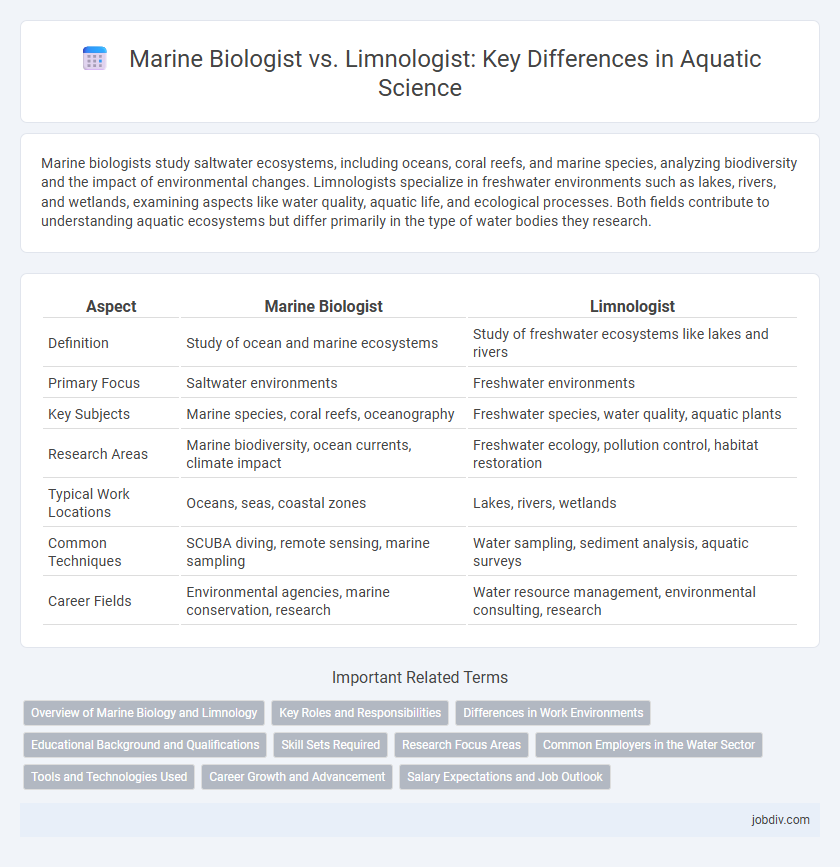Marine biologists study saltwater ecosystems, including oceans, coral reefs, and marine species, analyzing biodiversity and the impact of environmental changes. Limnologists specialize in freshwater environments such as lakes, rivers, and wetlands, examining aspects like water quality, aquatic life, and ecological processes. Both fields contribute to understanding aquatic ecosystems but differ primarily in the type of water bodies they research.
Table of Comparison
| Aspect | Marine Biologist | Limnologist |
|---|---|---|
| Definition | Study of ocean and marine ecosystems | Study of freshwater ecosystems like lakes and rivers |
| Primary Focus | Saltwater environments | Freshwater environments |
| Key Subjects | Marine species, coral reefs, oceanography | Freshwater species, water quality, aquatic plants |
| Research Areas | Marine biodiversity, ocean currents, climate impact | Freshwater ecology, pollution control, habitat restoration |
| Typical Work Locations | Oceans, seas, coastal zones | Lakes, rivers, wetlands |
| Common Techniques | SCUBA diving, remote sensing, marine sampling | Water sampling, sediment analysis, aquatic surveys |
| Career Fields | Environmental agencies, marine conservation, research | Water resource management, environmental consulting, research |
Overview of Marine Biology and Limnology
Marine biology studies oceanic ecosystems, focusing on saltwater species, coastal habitats, and the biological processes shaping marine life. Limnology investigates freshwater environments such as lakes, rivers, and wetlands, emphasizing aquatic organisms, water chemistry, and ecological interactions in inland waters. Both fields contribute critical knowledge to aquatic science but specialize in distinct habitats and ecological dynamics.
Key Roles and Responsibilities
Marine biologists study ocean ecosystems, focusing on the behavior, physiology, and interactions of marine organisms like fish, coral reefs, and plankton. Limnologists specialize in freshwater environments such as lakes, rivers, and wetlands, analyzing water chemistry, aquatic life, and ecological processes in these habitats. Both scientists contribute to conservation efforts, but marine biologists address saltwater biodiversity while limnologists focus on freshwater ecosystem health.
Differences in Work Environments
Marine biologists study organisms and ecosystems primarily in saltwater environments such as oceans and seas, conducting research on coral reefs, marine mammals, and coastal ecosystems. Limnologists focus on freshwater systems, including lakes, rivers, and wetlands, examining water quality, aquatic plants, and freshwater species. The distinct work environments require marine biologists to often work on boats or coastal areas, while limnologists typically conduct fieldwork in inland water bodies and laboratory settings analyzing freshwater samples.
Educational Background and Qualifications
Marine biologists typically hold degrees in marine biology, oceanography, or related fields, often requiring advanced studies or specialized certifications in marine ecosystems. Limnologists usually pursue education in freshwater ecology, environmental science, or biology with an emphasis on inland water bodies, often obtaining graduate degrees focused on lake and river systems. Both professions demand strong backgrounds in biological sciences, but marine biologists emphasize oceanic studies, whereas limnologists specialize in freshwater environments.
Skill Sets Required
Marine biologists require expertise in oceanography, marine ecosystems, species identification, and diving skills to study saltwater environments effectively. Limnologists focus on freshwater systems, emphasizing skills in water chemistry analysis, aquatic ecology, and hydrology to understand lakes, rivers, and wetlands. Both professions demand strong research abilities, proficiency with scientific equipment, and data analysis techniques tailored to their specific aquatic habitats.
Research Focus Areas
Marine biologists specialize in studying oceanic ecosystems, focusing on saltwater habitats, marine organisms, coral reefs, and oceanic biodiversity. Limnologists concentrate on freshwater systems such as lakes, rivers, and wetlands, investigating water quality, freshwater species, and aquatic ecosystem dynamics. Both fields employ interdisciplinary methods but differ primarily in their research focus on saltwater versus freshwater environments.
Common Employers in the Water Sector
Marine biologists and limnologists are primarily employed by government agencies such as the National Oceanic and Atmospheric Administration (NOAA) and the Environmental Protection Agency (EPA), which focus on coastal and freshwater ecosystems respectively. Research institutions and universities often hire both specialists to conduct studies on aquatic biodiversity, pollution, and conservation efforts. Environmental consulting firms are another significant employer, providing expertise in water quality assessments for both marine and freshwater projects.
Tools and Technologies Used
Marine biologists primarily utilize oceanographic instruments such as CTD sensors (Conductivity, Temperature, Depth), remotely operated vehicles (ROVs), and sonar mapping to study marine ecosystems. Limnologists employ tools like water quality probes, sediment samplers, and aquatic drones to analyze freshwater bodies such as lakes and rivers. Both specialists rely on GIS technology and advanced microscopy to monitor and assess aquatic biodiversity and environmental changes.
Career Growth and Advancement
Marine biologists studying ocean ecosystems often experience diverse career growth opportunities in research, conservation, and resource management within governmental and private sectors. Limnologists specializing in freshwater systems typically advance through roles in environmental monitoring, water quality assessment, and policy development, supported by agencies like the EPA and environmental consultancies. Both careers require continuous education and offer pathways to leadership positions in academic institutions, non-profits, and international environmental organizations.
Salary Expectations and Job Outlook
Marine biologists typically earn an average salary ranging from $50,000 to $90,000 annually, with job growth projected at 6% due to increasing interest in ocean conservation and marine ecosystems. Limnologists, specializing in freshwater environments, have salaries averaging between $45,000 and $80,000, with steady employment opportunities driven by expanding freshwater research and environmental monitoring programs. Both fields benefit from rising environmental awareness, but marine biology offers broader global research prospects compared to the often regional focus of limnology.
Marine Biologist vs Limnologist Infographic

 jobdiv.com
jobdiv.com